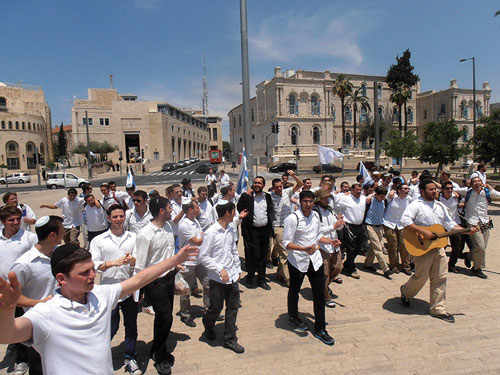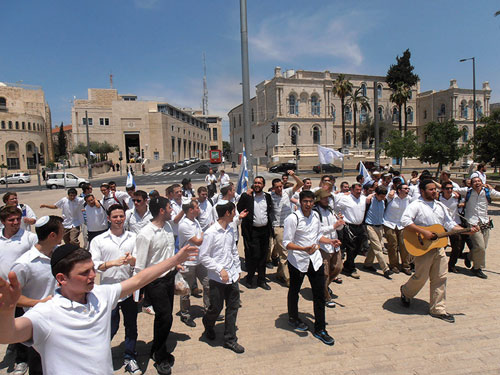
.jpg)
Jerusalem, Israel — “This is the [miraculous] day which God made, we will rejoice and be glad on it” (Psalms 118:24).
.jpg)
On Wednesday, May 8, Jewish people throughout the world celebrated the 46th anniversary of the unlikely Israeli victory in the Six-Day War and the miracle that led to the IDF recapturing the city of Jerusalem, including the Western Wall and Temple Mount. While most of the world celebrates Yom Yerushalayim (Jerusalem Day) with carnivals and blue-and-white cookies, in Israel everyone flocks to the Holy City for unique celebrations on the very ground where the miraculous victory occurred nearly half a century ago, where there are activities, celebrations, and concerts for people of all ages.
.jpg)
The Yom Yerushalayim festivities kicked off on Tuesday night after nightfall with recitations of the traditional Tefila Chagigit (celebratory prayer) and Arvit (evening service) in most synagogues. Afterwards, the celebrations shifted over to the main ceremony in the iconic Merkaz HaRav Yeshiva, founded by pre-Israel’s Chief Rabbi Avraham Isaac Kook, for an all-night celebration attended by many dignitaries and politicians including Jerusalem’s Mayor Nir Barkat. Throughout the night, the sounds of the festivities could be heard from the many concerts and parties, such as the Lila Lavan B’bira (White Night in the Capital) student concert featuring Infected Mushroom. The Mercaz Harav celebration continued until 2:00 in the morning when the participants danced from Merkaz HaRav to the Kotel Hama’aravi (Western Wall), where there was more dancing and singing and divrei torah from rabbinical figures of Jerusalem, concluding at sunrise with Tefilat Netz.
On Wednesday morning, one could feel the energy of Jerusalem coming alive as the streets of the city reverberated with the joy of Yom Yerushalayim. Early in the morning, the sounds of Hallel could be heard from synagogues throughout the city as Jews of all backgrounds united in giving their thanks to God for the miracles of the day. As the day progressed, and Israelis from around the country began to pour into the city, the energy grew exponentially. One could barely walk a single block without running into a group of youths, dressed in white and blue, dancing with joy and beckoning for others to join.
Throughout the day, there were activities available for everyone. There were memorial ceremonies taking place at Mt. Herzl—a bitter reminder of the price that was paid for the victory of the Six Day War. There were free tours of the Iriyah (Jerusalem Municipality Complex), and other sites around the city. Many ceremonies were open to all. But, for many, the best activity was to sit in the center of town and take in the scene around them: The once-dead city that has come back to life, a true fulfillment of “Jerusalem, built up, a city that is united” (Psalms 122:3).
Later in the afternoon, after a day of walking around and partaking in the joy of the city, came the climax of Yom Yerushalayim: the Rikudegalim (Dance of the Flags). The Rikudegalim, started in 1968 by Mercaz Harav, has grown to become one of biggest and most publicized events on Yom Yerushalayim, as over 60,000 Israeli youths and families took part this year in the ceremony. It is quite possibly one of the most beautiful parts of Yom Yerushalayim as its participants range from all sides of the religious spectrum, and it truly shows the unity of Jerusalem on its special day. The dance begins in front of the Great Synagogue of Jerusalem, where King George Street is closed off, a band stand is set up, Israeli flags are given out to all, and there is dancing in the street for several hours. It is an amazing scene to watch, with Israeli high school students, American yeshiva students, and others dancing together despite the difference in their backgrounds.
At about 6:30 p.m., as the sun began to set, the ceremony became a parade as this “sea of white and blue” began to march from the center of town to the Kotel via the Damascus Gate and the Muslim Quarter of the Old City. Through shouts of “Am Yisrael Chai” (“The Jewish Nation is Alive”) and “Yerushalayim Ir Shel Shalom” (“Jerusalem, City of Peace”), Jews walk the same path that Israeli paratroopers took in 1967 as they secured the Old City. The march ends at the Western Wall with a huge concert by musicians Chaim Dovid Saracik and Shlomo Katz, interspersed with speeches by rabbinic figures in Israel. This concert, taking place mere feet from the holiest site in Judaism, brings home the gravity of the miracle that took place then. What an appropriate way to end such a beautiful day.
“Lshana Haba B’Yerushalayim Habenuya”—what could be greater than next year, having all of world Jewry dancing together in these embracing and undying streets?
By Tzvi Silver








